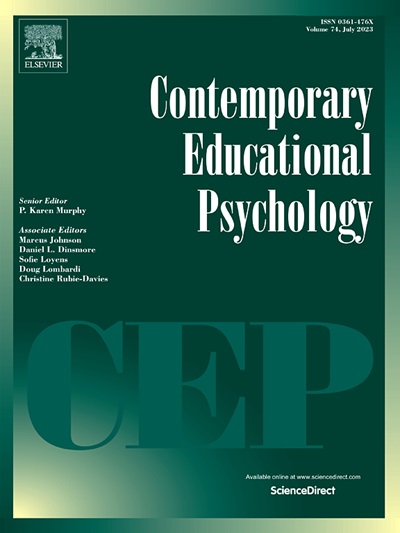An exploratory experiment investigating teachers’ attributional race and gender bias and the moderating effects of personal experience of racial discrimination
IF 3.8
1区 心理学
Q1 PSYCHOLOGY, EDUCATIONAL
引用次数: 0
Abstract
The factors to which teachers attribute students’ successes and failures have important consequences for teachers’ instructional decisions as well as their expectations of students. Yet few, if any, experimental studies have been conducted to investigate the role that students’ race and gender play in how teachers make sense of students’ academic performance. In this exploratory experimental study, conducted with 413 mathematics teachers across the United States, we investigated the extent to which teachers attributed students’ performance disparities in mathematics to internal and external factors based on the students’ race and gender and explored the extent to which teachers’ beliefs and dispositions moderated their attributions. To do so, teachers were first given a collection of the student solutions with no gender or racial performance disparities. They were then randomly assigned to one of four conditions in which they were told that on this particular assessment: boys outperformed girls, girls outperformed boys, Black and Hispanic students outperformed White and Asian students, or that White and Asian students outperformed Black and Hispanic students. They were asked to report the reasons behind the disparities in math performance of these groups. We found that teachers attributed gender disparities in student performance to innate math ability, effort, and external social factors, whereas they attributed racial disparities in student performance to biological influences on intelligence, effort, external social factors or the assessment context. Teachers’ self-reported personal experience with racial discrimination moderated race differences in teacher attributions.
一项探索性实验,调查教师的种族和性别偏见归因以及个人种族歧视经历的调节作用
教师将学生的成功和失败归因于哪些因素,这对教师的教学决策和对学生的期望 都有重要影响。然而,很少有实验研究(如果有的话)来探讨学生的种族和性别在教师如何理解学生学业成绩方面所起的作用。在这项由全美 413 名数学教师参加的探索性实验研究中,我们调查了教师根据学生的种族和性别,将学生数学成绩的差异归因于内部和外部因素的程度,并探讨了教师的信念和处置方式在多大程度上调节了他们的归因。为此,首先向教师们提供了一组没有性别或种族成绩差异的学生解决方案。然后,他们被随机分配到四种情况中的一种,在这种情况下,他们被告知,在这一特定的评估中:男生的成绩优于女生,女生的成绩优于男生,黑人和西班牙裔学生的成绩优于白人和亚裔学生,或者白人和亚裔学生的成绩优于黑人和西班牙裔学生。我们要求他们报告这些群体数学成绩差异背后的原因。我们发现,教师将学生成绩的性别差异归因于先天数学能力、努力程度和外部社会因素,而将学生成绩的种族差异归因于智力的生物影响、努力程度、外部社会因素或评估环境。教师自述的个人种族歧视经历调节了教师归因中的种族差异。
本文章由计算机程序翻译,如有差异,请以英文原文为准。
求助全文
约1分钟内获得全文
求助全文
来源期刊

Contemporary Educational Psychology
PSYCHOLOGY, EDUCATIONAL-
CiteScore
16.50
自引率
3.90%
发文量
74
期刊介绍:
Contemporary Educational Psychology is a scholarly journal that publishes empirical research from various parts of the world. The research aims to substantially advance, extend, or re-envision the ongoing discourse in educational psychology research and practice. To be considered for publication, manuscripts must be well-grounded in a comprehensive theoretical and empirical framework. This framework should raise critical and timely questions that educational psychology currently faces. Additionally, the questions asked should be closely related to the chosen methodological approach, and the authors should provide actionable implications for education research and practice. The journal seeks to publish manuscripts that offer cutting-edge theoretical and methodological perspectives on critical and timely education questions.
The journal is abstracted and indexed in various databases, including Contents Pages in Education, Australian Educational Index, Current Contents, EBSCOhost, Education Index, ERA, PsycINFO, Sociology of Education Abstracts, PubMed/Medline, BIOSIS Previews, and others.
 求助内容:
求助内容: 应助结果提醒方式:
应助结果提醒方式:


